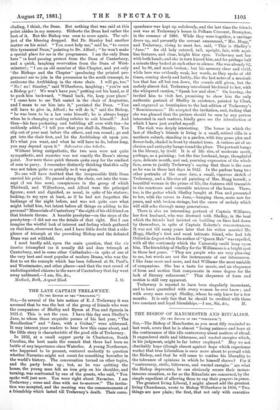THE LATE CAPTAIN TRELAWNEY.
[To THE EDITOR OF THE "SPECTATOR."] SIR,—In several of the late notices of E. J. Trelawney it was assumed that he was the last of the group of friends who were the companions of Shelley and Byron at Pisa and Spezzia in 1821-2. This is not the case. I have this day seen Shelley's Jane, to whom those exquisite poems of his last year, " The Recollection" and "Jane, with a Guitar," were addressed. It may interest your readers to hear how this came about, and the little story is characteristic of the good side of Trelawney.• In 1832, at a small supper party in Charleston, South Carolina, the host made the remark that there had been no battle of any importance since Waterloo. A young Northerner, who happened to be present, ventured modestly to question whether Navarino might not count for something hereafter in the world's history. The conversation turned on other topics, and the party broke up ; but, as he was quitting the house, the young man felt an iron grip on his shoulder, and turning, was confronted by one of the guests, who said, " You spoke well just now. You were right about Navarino. I am Trelawney ; come and dine with me to-morrow." The invita- tion was accepted, and the meeting was the commencement of a friendship which lasted till Trelawney's death. Their corre-
spondence was kept up sedulously, and the last time the friends met was at Trelawney's house in Pelham Crescent, Brompton, in the summer of 1880. While they were together, a carriage drove up, and presently the servant announced, " Mrs. Hogg," and Trelawney, rising to meet her, said, " This is Shelley's Jane." An old lady entered, tall, upright, fair, with aqui- line features, and clear, bright blue eyes. Trelawney met her with both hands, and she in turn kissed him, and for perhaps half a minute they looked at each other in silence. She was already 82, and he 88, and much broken ; but his memory clear and vivid, while hers was evidently weak, her words, as they spoke of old times, coming slowly and feebly, like the last notes of a musical- box that has all but run down, the sounds still given, but the melody almost fled. Trelawney introduced his friend to her, with the whispered caution, " Speak low and slow." On leaving, she invited him to visit her, promising to show him the only authentic portrait of Shelley in existence, painted by Clent, and engraved as frontispiece to the last edition of Trelawney's " Reminiscences." He accepted the invitation, and, finding that she was pleased that the picture should be seen by any person interested in such matters, kindly gave me the introduction of which I have just availed myself.
The visit was deeply interesting. The house in which the last of Shelley's friends is living is a small, retired villa in a northern suburb, standing in a garden, with tiny grass plot and flower-beds, shaded in front by stunted trees. A curious air of se- clusion and antiquity hangs round the place. The portrait hangs in the library, by itself. It is of life size, of moderate merit, perhaps, as a painting ; but the fine forehead, large, thoughtful eyes, delicate mouth, and sad, yearning expression of the whole face, seem to justify Trelawney's saying that there is the man as he was in those last days in 1822. In the parlour hang two other portraits of the same date, a small, vigorous sketch of Trelawney, and a life-size oil painting of Mrs. Hogg herself, a beautiful woman in the prime of life, the features still traceable in the courteous and venerable mistress of the house. There, too, is the guitar which Shelley bought at Pisa and presented to her, with the verses to Jane,—hanging there, mute now for years, and with broken strings, but the cause of melody which will still echo through many generations.
There is also an interesting portrait of Captain Williams, her first husband, who was drowned with Shelley, in the boat which the friends had insisted on building on lines laid down by themselves, in spite of Captain Roberts's remonstrances. It was not till many years later that his widow married Mr. Hogg, Shelley's first and most intimate friend, who had left Oxford in disgust when the author of " Queen Mab " was expelled, with all the contumely which the University could heap upon him. The friendship of Shelley for the Williamses is a bright spot in those last years. " They are people who are very pleasing to me, but words are not the instruments of our intercourse. I like Jane more and more, and find Williams the most amiable of companions. She has a taste for music, and an eloquence of form and motion that compensate in some degree for the lack of literary refinement." That eloquence of form and motion is still very apparent.
Trelawney is reputed to have been singularly inconstant, and to have quarrelled with every woman he ever knew ; and with every man except Shelley, whom he only knew for a few months. It is only fair that he should be credited with these two constant and loyal friendships.—I am, Sir, &c.,






























 Previous page
Previous page